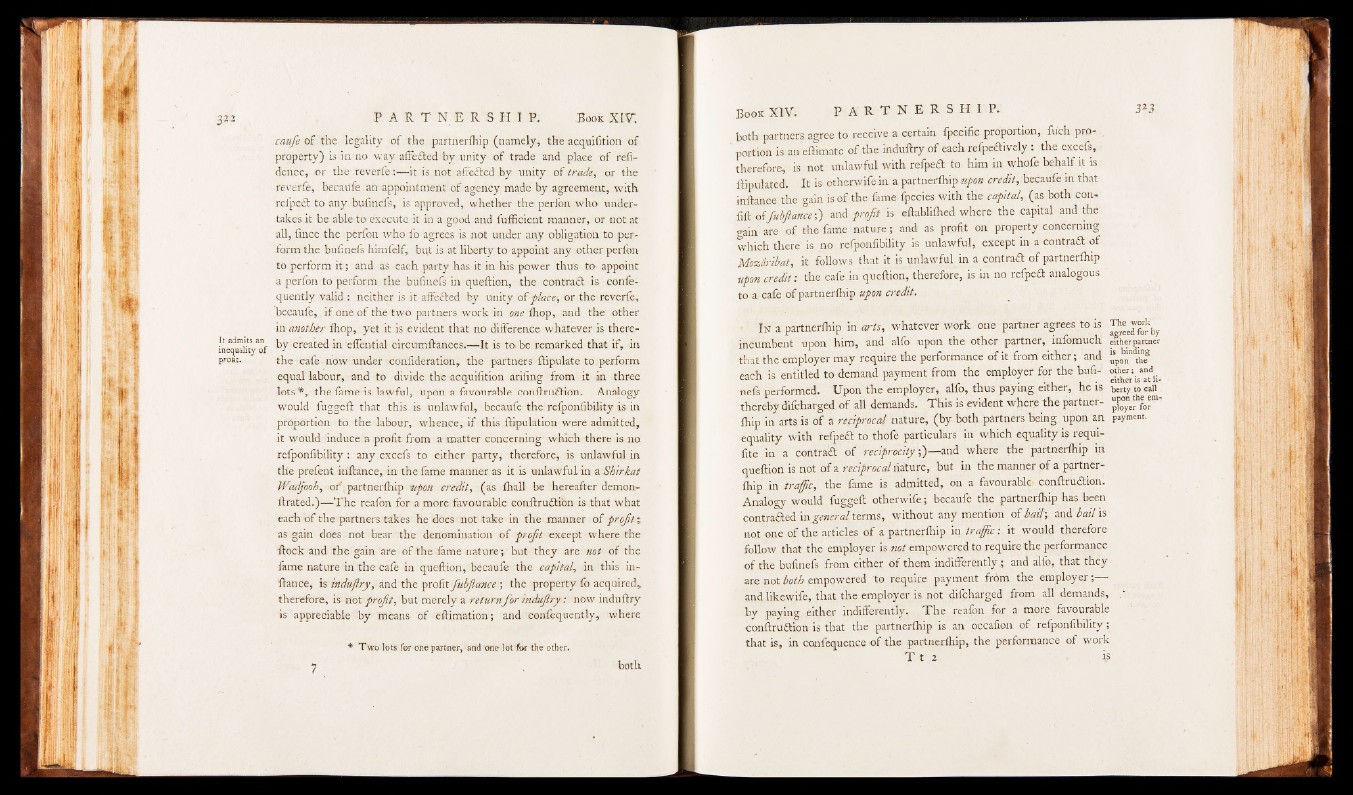
I l
It admits an
inequality of
profit.
caufe of the legality of the partnerlhip (namely, the acquifition of
property) is in no way affeCted by .unity of trade and place of refi-
dence, or the reverfe:— it is not affe£ted by unity of trade, or the
reverfe, becaufe an appointment of agency made by agreement, with
refpeCt to any bufinefs, is approved, whether the perfon who undertakes
it be able to execute it in a good and fufficient manner, or not at
all, lince the perfon who fo agrees is not under any obligation to perform
the bufinefs himfelf, bi\t is at liberty to appoint any other perfon
to perform i t ; and as each party has it in his power thus to- appoint
a perfon to perform the bufinefs in queftion, the contract is confe-
quently valid : neither is it affedted by unity, of place, or the reverfe,
becaufe, if one of the two partners work in one fhop, and the other
in another fhop, yet it is evident that no difference whatever: is thereby
created in elfential eircumftances.— It is to be remarked that if, in
the cafe now under confideration, the partners ftipulate to perform
equal labour, and to divide the acquifition arifing ifrom it in three
lots'*,, the fame is, lawful, upon a favourable conftruiftion. Analogy
would fuggeft that this - is unlawful, becaufe the refponfibility is in
proportion to the labour, whence, if this ftipulation were admitted,,
it would induce a profit from a matter concerning which there is no
refponfibility: any excefs to either party, therefore,, is unlawful in
the prefent inftance, in the fame manner as it is unlawful in a Shirkat
JVadjooh, of) partnerlhip upon credit, (as fhall be hereafter demon-
ftrated.)— The reafon for a more favourable conftrudtibn is that what
each of the partners takes he does not take in the manner of profit
as gain does : not bear the denomination of profit except where the
flock and the gain are of the-feme nature; but they are not of the
lame nature in the cafe in queftion, becaufe the capital, in this inftance,
is induflry, and the profit fuhfiance ; the property fo acquired,
therefore, is not profit, but merely a return fo r induflry: now induflry
is appreciable by means of eftimation; and confequently, where
both
both partners agree to receive a certain fpecific proportion, fuch pro- .
portion is an eftimate of the induflry of each refpedtively : the excefs, ■
therefore, is not unlawful with refpeft to him in whofe behalf it is
ftipulated. It is otherwife in a partnerlhip upon credit, becaufe in that
inftance the gain is of the fame fpecies with the capital, (as both con-
fift offubflance;) and profit is eflablifhed where the capital and the
gain are of the fame nature ; and as profit on property concerning
which there is no refponfibility is unlawful, except in a contraa of
Mozäribat, it follows that it is unlawful in a contraa of partnerlhip
upon credit: the cafe in queftion, therefore, is in no refpea analogous
to a cafe of partnerlhip upon credit.
In a partnerlhip in arts, whatever work one partner agrees to is
incumbent upon him, and alfo upon the other partner, infomuch
that the employer may require the performance of it from either; and
each is entitled to demand payment from the employer for the bufinefs
performed. Upon the employer, alfo, thus paying either, he is
The /work’
agreed for by
either partner
is binding
upon the
•other; and
either is at liberty
thereby difcharged of all demands. This is evident where the partner-
fhip in arts is of a reciprocal nature, (by both partners being upon an
equality with refpedt to thofe particulars in which equality is requi-
fite in a contract of reciprocity;)— and where the partnerlhip in
queftion is not of a reciprocal nature, hut in the manner o f a partner-
fhip in traffic, the fame is admitted, on a favourable conftrudtion.
Analogy would fuggeft otherwife; becaufe the partnerlhip has been
contracted in general terms, without any mention of bail-, and bail is
not one of the articles of a partnerlhip in traffic: it would therefore
follow that the employer is not empowered to require the performance
of the bufinefs from either Of them indifferently; and alfo, that they
are not both empowered to require payment frbm the employer;—
and likewife, that the employer is not difcharged from all demands,
by payincr either indifferently. The reafon for a more favourable
conftruClion is that the partnerlhip is an occafion of refponfibility;
that is, in confequence of the partnerlhip, the performance of work
T t 2 . , is
to call
upon the employer
for
payment.